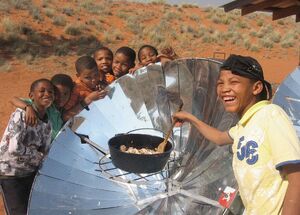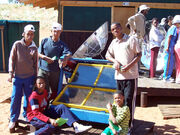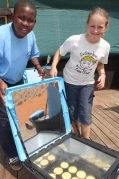Paul Hedrick (talk | contribs) (→Events) |
Tom Sponheim (talk | contribs) m (→Reports) |
||
| (22 intermediate revisions by 3 users not shown) | |||
| Line 1: | Line 1: | ||
| − | {{GoogleTranslateLinks}} |
+ | {{GoogleTranslateLinks}} |
| + | {{Updated|5|26|14}} |
||
==Events== |
==Events== |
||
| − | *'''September 24 - October 2, 2010: (Windhoek)''' The [[Döbra Solar Development Project]] will be present on this year's annual Windhoek Show to promote solar cooking and alternative energy production. The show has its origin in the agricultural sector, being the earliest backbone of the Namibian economy. The 1st Windhoek Agricultural Show in German South West Africa was held as early 2 and 3 June 1899, with 22 exhibitors. At that show, the farmers from Klein Windhoek exhibited a variety of products ranging from fresh produce to wine. [http://www.windhoekshow.na More information...] |
||
See [[Calendar of events]] |
See [[Calendar of events]] |
||
==News and Recent Developments== |
==News and Recent Developments== |
||
| + | [[File:NaDEET_user_survey,_11-13-13.jpg|right|140px]] |
||
| ⚫ | *'''July 2010:''' Students learn how to cook on solar. The final 20 students from a group of 60 received their certificates last week for successfully completing a training course on the use of alternative energy to help rural communities create conditions for sustainable living in [[Namibia]]. The project is possible through NaDEET, an NGO funded from the Small Grants Programme of the Global Environment Facility. |
||
| + | *'''November 2013: Informal survey leads to new directions''' - Project leaders surveyed young workshop participants and community leaders regarding their satisfaction with solar cooking. Overall, both urban and rural based learners viewed solar cooking positively despite perceived disadvantages around slower cooking times amongst urban users and the financial ability to acquire cookers for rural users. Both groups showed a good understanding of the benefits to the environment. |
||
| + | |||
| + | *'''September 2013:''' To increase ownership of alternative energy equipment in rural communities in southern [[Namibia]], the [[Namib Desert Environmental Education Trust]] (NaDEET) has this year invited representatives from the Rietoog, Aranos and Maltahöhe communities as well as students from the Agricultural Training Centre in Krumhuk to attend the NaDEET environmental education program. Sixty-eight participants earned solar cookers through NaDEET’s voucher testing system. This year one hundred parabolic solar cookers have been distributed to communities. |
||
| + | |||
| + | [[File:NaDEET_solar_cooking_training_2012,_2-11-13.jpg|thumb|300px|Young [[NaDEET]] students learning to use a [[parabolic solar cooker]].]] |
||
| + | *'''February 2013: More from Nailoke’s Solar House''' - [[Nailoke Niingungo]] summarizes the approach of the organization, [[NaDEET]], used for solar cooking promotion in [[Namibia]]. Morning meals are cooking over [[Fuel-efficient woodstove]]s and meals later in the day are prepared with solar cookers. [[haybasket|Hay baskets]] are primarily used for keeping food warm until dinner is served. Beside instruction in using solar cookers, workshop participants are trained in their construction as well. They are also shown how to make recycled paper firebricks for use in the [[Rocket stove]]s. Moreover, program attendees receive vouchers for purchasing solar cookers at a reduced price if they show they have successfully completed the training program. |
||
| + | |||
| + | *'''November 2012: GloboSol annual report: Namibia - Nailoke’s Solar House''' - [[Nailoke Niingungo]] is a woman who puts considerable effort into improving living conditions and protecting the environment in the area where she lives in [[Namibia]]. Her means to do that is to promote solar ovens by partnering with [[GloboSol]]. To make people aware of solar cooking, she bakes bread on a daily basis and roasts peanuts, which are then sold, providing a modest income. Currently, the solar ovens are built at two different locations, a situation which is working, but needs to be improved. Likewise, the sales of the solar ovens have not yet met their expectations of the potential market. |
||
| + | |||
| + | *'''September 2011:''' The [[Namib Desert Environmental Education Trust]] (NaDEET), a non-profit Namibian trust geared towards protecting Namibia’s natural environment through educating citizens how to live sustainably, has to date donated about 70 solar cookers to almost 150 people in the South. In 2010 NaDEET expanded its youth orientated programmes to include adults, in order to expand knowledge about solar cooking and related issues, such as climate change. A survey done prior to the training found that 57 per cent of the adults did not know about climate change. Viktoria Keding, director of NaDEET, explained there is a misperception that children are the primary target, whereas adults are just as eager to learn and adapt, especially when the benefits are clear. [http://www.namibian.com.na/news/full-story/archive/2011/september/article/shining-a-light-on-solar-cooking/ Read more...] |
||
| + | |||
| + | *'''April 2011:''' [[Jon Maravelias]] of the NGO, [[NaDEET]], traveled to five communities in [[Namibia]] to evaluate results of previous solar cooking workshops conducted by the organization. The areas are mostly rural and poor. He reports; In general, it seemed that the poorer you were, the more you relied on solar cooking since it meant you did not need to collect firewood for the day. He visited several women who use the solar cooker and fuel-efficient stoves to heat their bath water and to cook all of their meals. The most successful communities were the ones with a traditional power structure. Both the communities of Maltahohe and Bethanien were under the leadership of two elder women. NaDEET also has been active in planting new trees in this mostly barren area. |
||
| ⚫ | *'''July 2010:''' Students learn how to cook on solar. The final 20 students from a group of 60 received their certificates last week for successfully completing a training course on the use of alternative energy to help rural communities create conditions for sustainable living in [[Namibia]]. The project is possible through NaDEET, an NGO funded from the Small Grants Programme of the Global Environment Facility. |
||
*'''June 2010:''' The Ministry of Mines and Energy is promoting and encouraging communities to make use of solar stoves and cookers to save firewood, electricity and other fuels. Speaking recently in Windhoek, Selma-Penna Utonih, Director of Energy in the Ministry of Mines, commended the Dr. Frans Aupa Indongo Primary School for its efforts working with students and their parents distributing solar cookers. [http://www.newera.com.na/article.php?articleid=11322 More Information...] |
*'''June 2010:''' The Ministry of Mines and Energy is promoting and encouraging communities to make use of solar stoves and cookers to save firewood, electricity and other fuels. Speaking recently in Windhoek, Selma-Penna Utonih, Director of Energy in the Ministry of Mines, commended the Dr. Frans Aupa Indongo Primary School for its efforts working with students and their parents distributing solar cookers. [http://www.newera.com.na/article.php?articleid=11322 More Information...] |
||
[[Image:Baking-bread-at-nadeet_-_Miriam_Kashia_2008.jpg|thumb|right|Peace Corps volunteer and friends bake bread in Nadeet.]] |
[[Image:Baking-bread-at-nadeet_-_Miriam_Kashia_2008.jpg|thumb|right|Peace Corps volunteer and friends bake bread in Nadeet.]] |
||
| Line 40: | Line 53: | ||
*[[Solar cooker dissemination and cultural variables]] |
*[[Solar cooker dissemination and cultural variables]] |
||
| − | == |
+ | ==Resources== |
| + | ===Handbooks=== |
||
| + | *'''2014:''' [http://www.nadeet.org/sites/default/files/pdf/educational_material/It%27s%20Time%20to%20Solar%20Cook.pdf It's Time to Solar Cook - A Guide and Cookbook] - ''NaDEET'', ''Viktoria Keding & Elizabeth Lammert'' |
||
===Reports=== |
===Reports=== |
||
*'''1995:''' [http://solarcooking.org/research/fi/petri.htm Solar Cookers for Use in Nambia] - ''[[Petri Konttinen]]'' |
*'''1995:''' [http://solarcooking.org/research/fi/petri.htm Solar Cookers for Use in Nambia] - ''[[Petri Konttinen]]'' |
||
===Articles in the media=== |
===Articles in the media=== |
||
| − | *''' |
+ | *'''September 2011:''' [http://www.namibian.com.na/news/full-story/archive/2011/september/article/shining-a-light-on-solar-cooking/ Shining a light on solar cooking] - ''The Namibian'' |
| + | |||
| − | *'''June 2010:''' [http://www.newera.com.na/article.php?articleid=11322 Namibia embraces renewable energy] - ''New Era'' |
||
| + | *'''February 2010:''' [http://allafrica.com/stories/201002160177.html Solar Stoves Cooking Up a Storm Countrywide] - ''The Namibian'' |
||
| + | |||
*'''September 2008:''' [http://allafrica.com/stories/200809050969.html Namibia: Nation Switches On to Solar Power] - ''The Namibia'' |
*'''September 2008:''' [http://allafrica.com/stories/200809050969.html Namibia: Nation Switches On to Solar Power] - ''The Namibia'' |
||
| + | |||
*'''May 2007:''' [http://allafrica.com/stories/200705180301.html Namibia: Solar Baking Oven Would Save Wood, Environment and Electricity] - ''New Era'' |
*'''May 2007:''' [http://allafrica.com/stories/200705180301.html Namibia: Solar Baking Oven Would Save Wood, Environment and Electricity] - ''New Era'' |
||
{{CountryContacts}} |
{{CountryContacts}} |
||
| − | |||
| − | ==Possible funders of solar cooking projects in {{PAGENAME}}== |
||
| − | *[[GEF Small Grants Programme]] |
||
| − | *See also general guidance on [[raising funds through grants and donations]] |
||
| − | |||
| − | ==See Also== |
||
| − | *[[:Category:{{PAGENAME}}|Click here for the complete list of Solar Cooking Wiki articles related to {{PAGENAME}}]] |
||
[[Category:Southern Africa]] |
[[Category:Southern Africa]] |
||
[[Category:Africa]] |
[[Category:Africa]] |
||
| − | [[Category:Countries |
+ | [[Category:Countries]] |
| − | [[Category:{{PAGENAME}}]] |
||
Revision as of 16:28, 27 May 2014
|
Last edited: 26 May 2014
|
Events
News and Recent Developments
- November 2013: Informal survey leads to new directions - Project leaders surveyed young workshop participants and community leaders regarding their satisfaction with solar cooking. Overall, both urban and rural based learners viewed solar cooking positively despite perceived disadvantages around slower cooking times amongst urban users and the financial ability to acquire cookers for rural users. Both groups showed a good understanding of the benefits to the environment.
- September 2013: To increase ownership of alternative energy equipment in rural communities in southern Namibia, the Namib Desert Environmental Education Trust (NaDEET) has this year invited representatives from the Rietoog, Aranos and Maltahöhe communities as well as students from the Agricultural Training Centre in Krumhuk to attend the NaDEET environmental education program. Sixty-eight participants earned solar cookers through NaDEET’s voucher testing system. This year one hundred parabolic solar cookers have been distributed to communities.

Young NaDEET students learning to use a parabolic solar cooker.
- February 2013: More from Nailoke’s Solar House - Nailoke Niingungo summarizes the approach of the organization, NaDEET, used for solar cooking promotion in Namibia. Morning meals are cooking over Fuel-efficient woodstoves and meals later in the day are prepared with solar cookers. Hay baskets are primarily used for keeping food warm until dinner is served. Beside instruction in using solar cookers, workshop participants are trained in their construction as well. They are also shown how to make recycled paper firebricks for use in the Rocket stoves. Moreover, program attendees receive vouchers for purchasing solar cookers at a reduced price if they show they have successfully completed the training program.
- November 2012: GloboSol annual report: Namibia - Nailoke’s Solar House - Nailoke Niingungo is a woman who puts considerable effort into improving living conditions and protecting the environment in the area where she lives in Namibia. Her means to do that is to promote solar ovens by partnering with GloboSol. To make people aware of solar cooking, she bakes bread on a daily basis and roasts peanuts, which are then sold, providing a modest income. Currently, the solar ovens are built at two different locations, a situation which is working, but needs to be improved. Likewise, the sales of the solar ovens have not yet met their expectations of the potential market.
- September 2011: The Namib Desert Environmental Education Trust (NaDEET), a non-profit Namibian trust geared towards protecting Namibia’s natural environment through educating citizens how to live sustainably, has to date donated about 70 solar cookers to almost 150 people in the South. In 2010 NaDEET expanded its youth orientated programmes to include adults, in order to expand knowledge about solar cooking and related issues, such as climate change. A survey done prior to the training found that 57 per cent of the adults did not know about climate change. Viktoria Keding, director of NaDEET, explained there is a misperception that children are the primary target, whereas adults are just as eager to learn and adapt, especially when the benefits are clear. Read more...
- April 2011: Jon Maravelias of the NGO, NaDEET, traveled to five communities in Namibia to evaluate results of previous solar cooking workshops conducted by the organization. The areas are mostly rural and poor. He reports; In general, it seemed that the poorer you were, the more you relied on solar cooking since it meant you did not need to collect firewood for the day. He visited several women who use the solar cooker and fuel-efficient stoves to heat their bath water and to cook all of their meals. The most successful communities were the ones with a traditional power structure. Both the communities of Maltahohe and Bethanien were under the leadership of two elder women. NaDEET also has been active in planting new trees in this mostly barren area.
- July 2010: Students learn how to cook on solar. The final 20 students from a group of 60 received their certificates last week for successfully completing a training course on the use of alternative energy to help rural communities create conditions for sustainable living in Namibia. The project is possible through NaDEET, an NGO funded from the Small Grants Programme of the Global Environment Facility.
- June 2010: The Ministry of Mines and Energy is promoting and encouraging communities to make use of solar stoves and cookers to save firewood, electricity and other fuels. Speaking recently in Windhoek, Selma-Penna Utonih, Director of Energy in the Ministry of Mines, commended the Dr. Frans Aupa Indongo Primary School for its efforts working with students and their parents distributing solar cookers. More Information...

Peace Corps volunteer and friends bake bread in Nadeet.
- January 2009: Miriam Kashia reports that 60 recent Peace Corps volunteers were provided with solar cookers manufactured in Namibia. They each took these to their villages for use there. More information.
- May 2007: Namibia: Solar Baking Oven Would Save Wood, Environment and Electricity - New Era
- August 2006: A solar cooker project in Ongwediva won an "Inspiration Lives in Africa" award from Namibia's Standard Bank in April. Ongwediva's Solar Stove Project, now in its eighth year, introduces solar cooking to women to combat deforestation and to provide employment opportunities like solar bakeries and catering. The award, worth 50,000 Namibian dollars, will be used to increase marketing activities.
The History of Solar Cooking in Namibia
A workshop was presented at the Varese, Italy, meeting in 1999 by a solar promoter, Harald Schutt. He described the construction and dissemination of solar stoves in Namibia over a period of 8 years in the 1990s. His initial exposure was provided in a workshop in Germany presented by representatives of the ULOG group (see description in the section on Multi-National Promoters). Following that, Mr. Schutt worked in Namibia, initially in a refugee camp and later in settled communities, teaching Namibians how to build a wooden box cooker and how to use the device. Female carpentry-trainers were taught the techniques of making the overt, and considerable experimentation was done to keep costs low while still producing quality devices.
This solar promoter has distilled lessons he has learned in many years. His view include the following: use a solar stove yourself, use schools as teaching sites, create social clubs around solar cooking, train builders of stoves of high quality; launch publicity campaigns to raise awareness, includingd emonstrations at sports events, supermarkets, clinics, and schools (Varese, p. 215). Nothing is known however about the outcome of this work in Namibia.
Climate, Culture, and Special Considerations
See also
- Discussion of southern Africa's suitability for solar cooking
- Solar cooker dissemination and cultural variables
Resources
Handbooks
- 2014: It's Time to Solar Cook - A Guide and Cookbook - NaDEET, Viktoria Keding & Elizabeth Lammert
Reports
- 1995: Solar Cookers for Use in Nambia - Petri Konttinen
Articles in the media
- September 2011: Shining a light on solar cooking - The Namibian
- February 2010: Solar Stoves Cooking Up a Storm Countrywide - The Namibian
- September 2008: Namibia: Nation Switches On to Solar Power - The Namibia
- May 2007: Namibia: Solar Baking Oven Would Save Wood, Environment and Electricity - New Era
Contacts
The entities listed below are either based in Namibia, or have established solar cooking projects there:
SCI Associates
- Main article: Solar Cookers International Association

